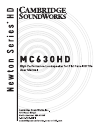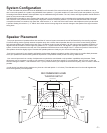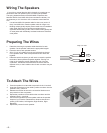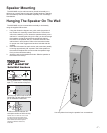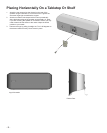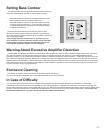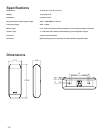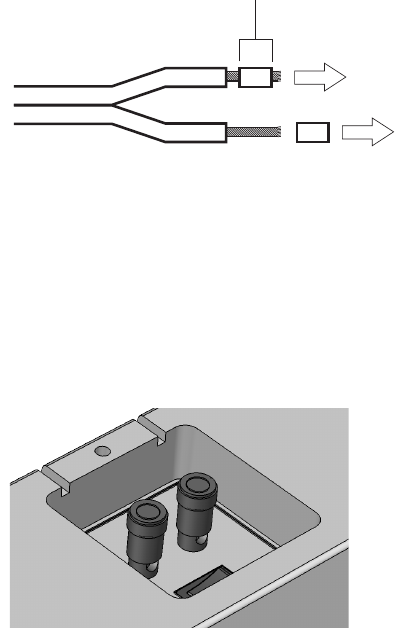
- 6 -
Wiring The Speakers
If you wish to conceal the wire within the walls, it is easiest to run
the wires to their nal positions prior to mounting the speakers.
The spring loaded terminals of the MC630HD accept bare wire
between AWG #12 and AWG #18 (lower numbers are thicker). It is
not necessary to “tin” the wire or use connectors to terminate the
wire.
Use at least AWG #18 speaker cable for short runs (under 15
feet). Use AWG #16 or heavier speaker cable for longer runs.
Building codes typically require plenum rated wire for installation
within walls. Be sure to use wire that complies with any
applicable local building codes. Plenum rated cable typically has
an outer jacket with individually insulated conductors inside the
outer jacket.
•
•
Preparing The Wires
Determine how long the speaker cable should be for each
speaker. Cut the speaker cable into the appropriate lengths.
Route the wire to each speaker location.
Strip 1/2 inch of insulation from the two individual conductors
in the speaker cable. Twist the exposed strands of bare wire
together.
Determine which conductor you will use to connect the positive
terminals of the amplier and speaker together. Printing or a
ridge on the insulation usually distinguishes one of the two
conductors. Sometimes the metal of the conductors has two
different colors, or the insulation color of each conductor may be
different.
1.
2.
3.
4.
Strip 1/2 inch
To Attach The Wires
Press the speaker’s red terminal to expose the hole in its shaft.
Insert the stripped end of one cable’s positive conductor into the
speaker’s red (+) terminal.
Release the terminal to secure the connection. Make sure no
stray strands of wire are present.
Repeat the procedure for the cable’s other conductor and the
speaker’s black (–) terminal.
Connect the opposite end of the speaker cable to the speaker
outputs of your receiver. Remember to observe channel and
polarity (Left Positive, Left Negative, Right Positive, Right
Negative).
Repeat the process for each speaker.
1.
2.
3.
4.
5.
6.



